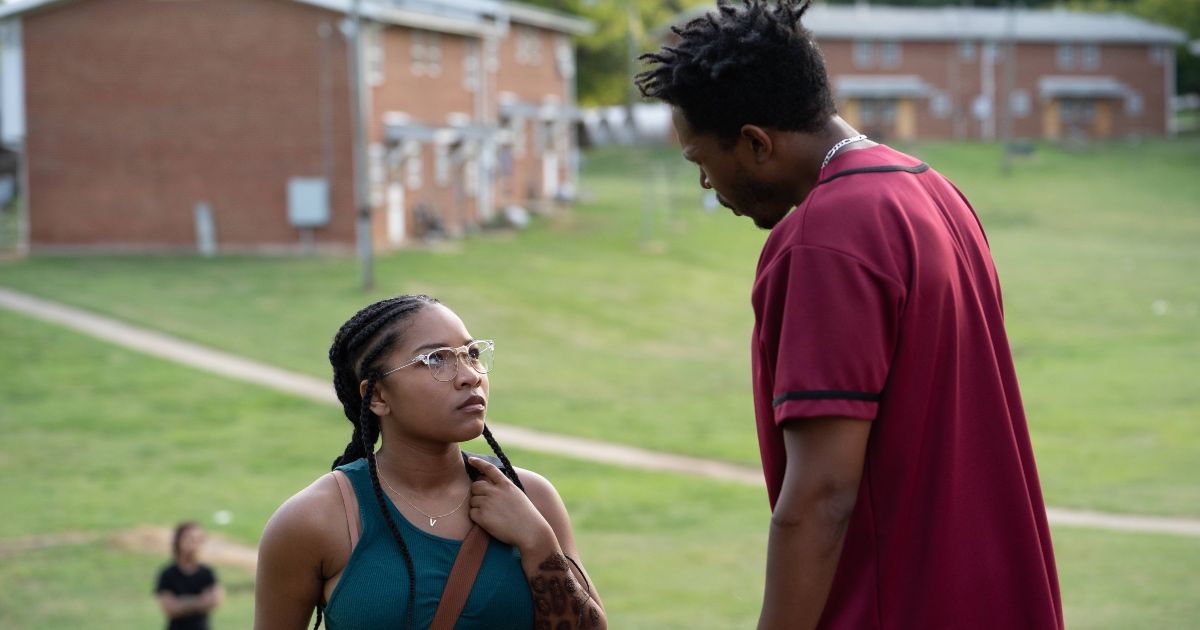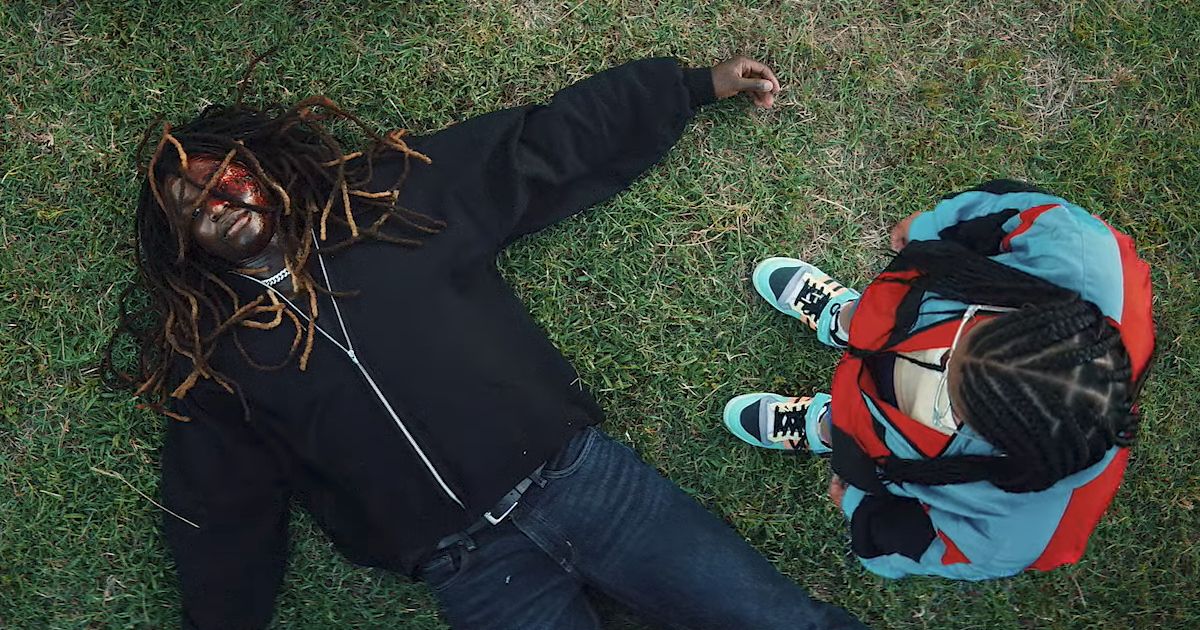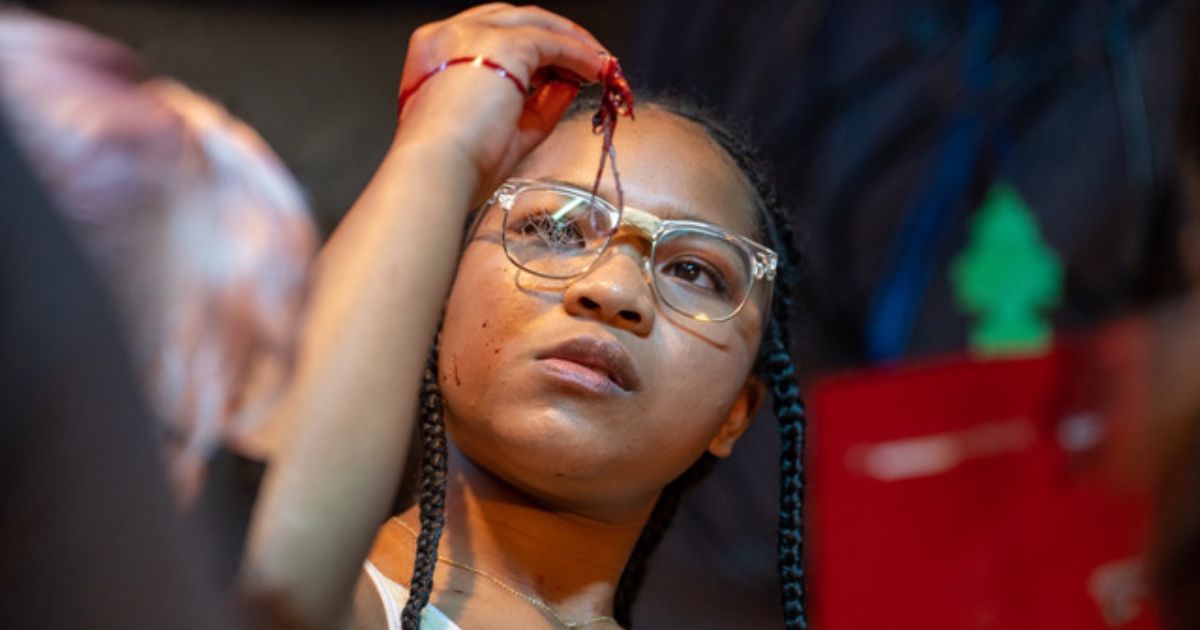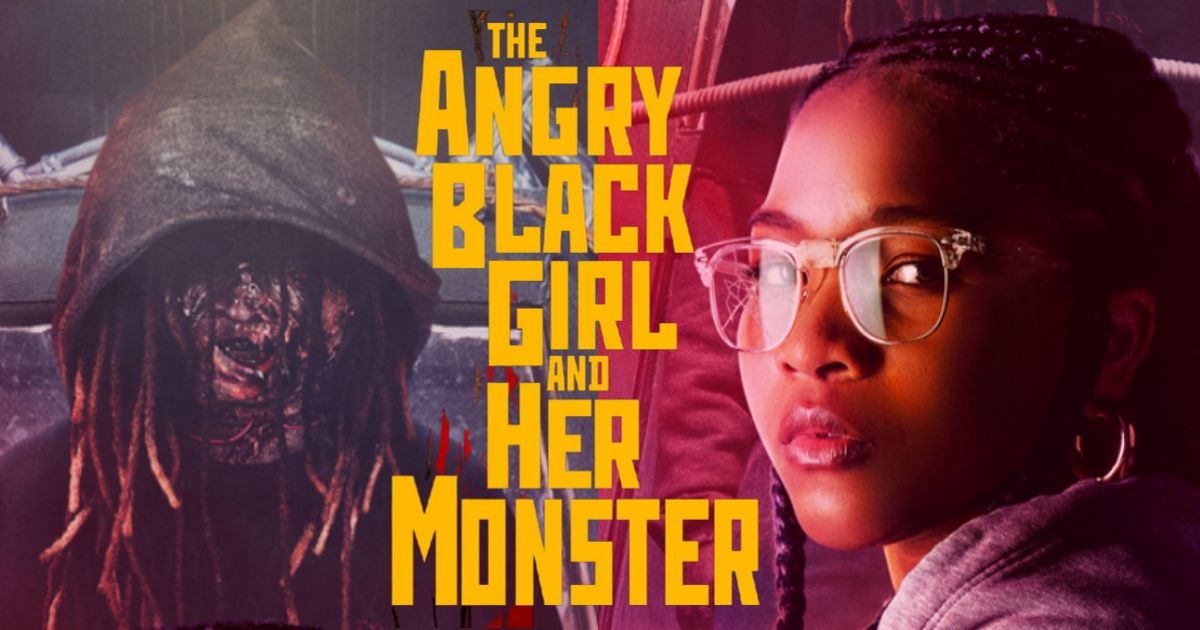The Angry Black Girl and Her Monster is the vision of writer/director Bomani J. Story, and the new horror film revolutionizes the classic tale of Frankenstein by audaciously intertwining an urban and socioeconomic twist throughout an eerie and deliciously disturbing take on a time-proven drama.
As if it’s not enough that the brilliant young protagonist Vicaria — portrayed by the equally brilliant actress Laya DeLeon Hayes (The Equalizer TV series) — is living out her youth entombed in a community that is haunted by gang violence, bigoted teachers, and drugs. Already suffering the loss of her mother, when her brother is heartlessly murdered, it becomes a catalyst to her scientific obsession. Determined to cure death, she soon owns up to her unwelcome nickname, “The Mad Scientist,” by working to resurrect her slain brother.
Or so it seems.
In the satirical and creepy tradition of Jordan Peele, there is so much more happening in The Angry Black Girl and Her Monster than meets a casual watch. Dig deeper into the title alone, never mind the richly layered dialogue and sensationally symbolic visuals, and there are real questions to be explored and intentional conversations to be awakened.
Is the Black girl truly angry? Says who? And is the lifeless Black man truly a monster? Or is that a tag assigned as a result of society’s stereotypical perception of even a dead Black man?
And then there is also the chilling depth of Kango, one of the characters in the film. He’s a drug dealer with — dare one be willing to entertain the idea — a purpose, even if only in his own eyes. He views addiction as an emotional matter and considers his narcotic-pushing service as a means of therapy for the pain. It’s a sick justification, considering that drugs ruin more lives and communities than they save, and yet it is compelling stuff delivered from a captivating and accomplished actor.
NAACP Image Award-winning Denzel Whitaker (The Great Debaters, Black Panther) sat down with MovieWeb to discuss the socially conscious and intellectually stimulating horror film, The Angry Black Girl and Her Monster, in which he stars — and soars — as Kango.
Denzel Whitaker Defies the Drug Dealer Stereotype
America, and the African American community in particular, grew to value and embrace Whitaker when introduced to him as a kid on The Oprah Winfrey Show and in such culturally uplifting films as The Great Debaters and Black Panther. And so, it is initially shocking but then — due to his tremendous talent as a now 32-year-old actor — eventually alluring to watch him in a role that is such a significant pivot from the distinguished characters of his past. Kango is an unsettling and intriguing image of brilliance entrapped in the shackles of living life as a malicious drug dealer.
There is a reason, a purposeful reason, why Whitaker made the decision to be a part of The Angry Black Girl And Her Monster in this role. The actor explained:
First, what really drew me to the character is Bomani’s vision. You can read the character on paper, but then you realize there is more to him. One of the things that I’m adamant, or at least conscious, about is not playing the same character I’ve played in the past, but also not perpetuating the stereotypes, especially within Black culture…
“So, while Kango could have been just an average hood drug dealer who is up to no good, it was really Bomani’s vision that gave me, and all the cast, the opportunity to create well-rounded, three-dimensional characters,” continued Whitaker. “I read the script and I really wanted to be a part of that shaping.”
What Whitaker is referring to is his outstanding job of giving purpose, depth, and a soul to Kango. Speaking from the perspective of an African American male specifically, Whitaker said, “Society has basically told us what we should be, rather than who we are, or what we can be. So, for me, it was about finding those layers beneath the surface for Kango despite that.”
Becoming Kango
Despite being, obviously, a grown man now, Whitaker still genuinely has the real-life presence of the nicer and more approachable guy that we are accustomed to seeing him portray during his younger days. He said that he is completely aware of this dichotomy and willingly explores it in his reflections on how he had to dig deep to connect with and develop his character.
“I think you can kind of tell, in person, that what we see with Kango is not my natural skin,” said Whitaker. “I’m not a threatening person, but he had to be. So, for more challenging characters like Kango I really just dive into the challenge headfirst.”
Specifically, he shared his process, and research, for accessing the mindset of a character that is so immensely different from who he is as a person. “Because we shot in North Carolina for a whole month, the entire time while we were down there, in my downtime, there was only one thing I watched and that was The Wire.”
Whitaker is referring to the socially conscious and NAACP, Primetime Emmy, Directors Guild and Writers Guild award-winning HBO series The Wire, which was celebrated by devotees of the show for all five seasons for its street realism. Coincidentally, the series also starred one of his co-stars in The Angry Black Girl and Her Monster, the great Chad L. Coleman, as the fan-favorite character “Cutty.”
“I thought that show was such an interesting and authentic portrayal of what real drug dealers in the community and the inner workings of Baltimore were like,” continued Whitaker. “In particular, I wanted to blend the characters of Stringer Bell (Idris Elba) and Marlo Stanfield (Jamie Hector) and explore what it would be like to be intimidating, taking balance from those different types of characters, equalizing being smart with being tactical as well.”
He added, “And, though I kinda hate to put it this way, it was also accepting that it is necessary to strike fear into the hearts of the people around you. It’s about commanding respect. It’s a dark side of leadership, but also inside not necessarily wanting to do violence, yet having to put the bread on the table. It was about being open to understanding what it would be like to have to put on that type of person’s skin every day and asking myself, ‘Why does a person make those choices?'”
Killing Kango
It is likely that Whitaker’s portrayal will draw respectable comparisons to the other Denzel, whom he was named after. Denzel Washington’s Oscar-winning role in Training Day was not necessarily against type — because his acting range is boundless — but initially against comfort for the fans who also, as in the case with Whitaker, had to initially adjust to not seeing him in an upright and traditionally honorable role.
Denzel Washington told then talk-show host Charlie Rose that he himself requested that his character, a wicked drug-dealing cop named Alonzo, be killed on-screen at the end of Training Day. Referencing a Biblical scripture, “For the wages of sin is death” (Romans 6:23), Washington requested this ending to also truly rid himself of the intoxicating vileness of his character which he had to, in a way, be willingly possessed by for his incredible portrayal.
Whitaker explained how he approached the necessary disassociation from such a powerfully immoral role after filming. “First,” he admitted. “I have to add that my mom cannot stand when I do characters like this. She just cannot stand it. She’s like ‘That’s not my baby.’” Fans who have watched Whitaker grow up on screen, and cheered as he has evolved in such a remarkable way, can join his mother in being assured that he took conscious measures to leave his haunting and unforgettable character on set.
He said, “Anytime that I have to do really intense character work, I immediately go back to my happy place after filming. I go back to my happy music. I get around my community, my family, and all the things that make me smile. And it works.”
He added, “It’s interesting though because you do wear a character for so long and sometimes if you’re not self-aware you can inadvertently pick up traits from the character because you’ve had to put it in your body for the performance. You have to consciously shake that.”
Reflecting on some of the other roles that he has had over the years which also required a definite detoxing, Whitaker said, “I’ve had other times, in addition to Kango of course, when I’ve had to come out of character and had to say, ‘Okay, I gotta check this character at the front door right now. I gotta say my prayers and do some meditation and get back centered.’ That only takes like a couple of days, at the most, and then it’s out of my body.”
Redeeming Kango
In a haunting quote, Vicaria says during the movie, “Death is a disease that broke my family,” and Whitaker reflected on the significance of those words and how they also apply to the unfortunate life of his character, Kango.
“It’s a powerful quote, and it also leads me to another quote from Mahatma Gandi which says, ‘An eye for an eye will only make the whole world blind.’ We see that a lot within our community because death is so mean and so hard to process. A lot of times individuals don’t have the emotional tools to handle death — like in The Angry Black Girl and Her Monster — and so it’s about resorting to retaliation. It’s about the get-back. Unfortunately, people try to numb themselves by getting vengeance and that’s how it spreads and becomes like a disease. A brother or sister is taken away, so then someone goes and takes someone else’s family member away.”
Going further into the specific impact of this film and its timeliness in regard to the bigger discussion of cultural warfare, Whitaker said, “It’s a great example of how, like ourselves, there’s more to these characters than what’s on the surface. There is so much more than what is acknowledged by society. I love that Bomani was able to take the story of Frankenstein and kind of put it on its head, but not in a way where it was typical. It’s just as much about Vicaria and her plight as it is about the concept of Frankenstein. This monster is almost an extension of how she’s feeling, an extension of the hurt, the pain, the trauma, that she’s enduring from death within the community.”
Giving continued and warranted praise to Bomani’s vision, Whitaker said about his character, Kango, in particular, “What this film does really well is peel back layers, and you get to see the inner workings of a person, the inner humanity. And then you have the opportunity to take a step back and question the idea of who the person should be and also why — rather than letting them blossom and be who they can be — the societal system forces people to have to choose and fit into boxes rather than flourish.”
This thought can lead to the redemption, or at least reconsideration, of the image, of the character, of the idea of someone like Kango.
“If you imagine Kango’s backstory, he could have been a scholar, he could have gone to the school Vicaria goes to, but by the trait of his community, his family is probably hood royalty, OG’s, and so naturally he slips into the game. How many times do you see someone like Kango within our community?” asked Whitaker. “Young, gifted, bright individuals, loving individuals, caring individuals… They could be world leaders of tomorrow, but they don’t necessarily have the outlets to get there.”
From RLJE Films, The Angry Black Girl and Her Monster is in select theaters now, and it will be available to view on demand beginning June 23, 2023. It will also stream on ALLBlk and on Shudder at a later date.
Stay connected with us on social media platform for instant update click here to join our Twitter, & Facebook
We are now on Telegram. Click here to join our channel (@TechiUpdate) and stay updated with the latest Technology headlines.
For all the latest Education News Click Here




